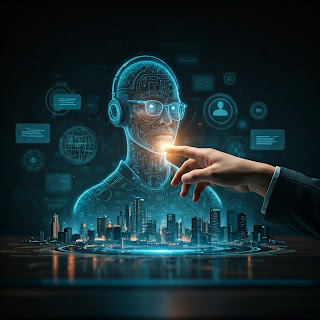The Future of Customer Service: AI, Automation, and Human Connection
Introduction
The landscape of customer service is undergoing a rapid transformation, driven by advancements in artificial intelligence (AI) and automation. While these technologies offer significant benefits, there's a growing concern about the potential erosion of human connection in customer interactions. In this post, we'll explore how AI and automation are shaping the future of customer service and discuss the importance of maintaining a human touch.
The Rise of AI and Automation
- Chatbots and Virtual Assistants: AI-powered chatbots and virtual assistants are becoming increasingly sophisticated, capable of handling a wide range of customer inquiries and
requests. - Automation of Routine Tasks: Automation tools can streamline repetitive tasks, freeing up human agents to focus on more complex issues.
- Predictive Analytics: AI can analyze customer data to anticipate needs and proactively address potential problems.
Benefits of AI and Automation
- Improved Efficiency: Automation can reduce response times and increase efficiency.
- 24/7 Availability: AI-powered systems can provide customer support around the clock.
- Personalized Experiences: AI can use customer data to deliver tailored recommendations and offers.
The Human Touch: A Critical Component
While AI and automation offer many advantages, there's a growing recognition of the importance of human interaction in customer service.
- Empathy and Understanding: Humans are better equipped to empathize with customers and understand their emotional needs.
- Complex Problem Solving: AI may struggle with complex or unusual customer issues that require human judgment and creativity.
- Building Relationships: Strong customer relationships are often built on personal connections and trust, which are difficult to replicate with AI.
The Future of Customer Service: A Balanced Approach
The future of customer service likely lies in a balanced approach that combines the efficiency of AI and automation with the human touch.
- Hybrid Models: Customer service teams can use AI to handle routine tasks while reserving human agents for more complex or emotionally charged interactions.
- Augmented Intelligence: AI can augment human capabilities by providing insights and recommendations.
- Ethical Considerations: As AI and automation become more prevalent, it's essential to consider ethical implications and ensure that technology is used responsibly.
Conclusion
The future of customer service is exciting and full of potential. By leveraging the power of AI and automation while maintaining a strong focus on human connection, businesses can deliver exceptional experiences that foster customer loyalty and satisfaction.
Credit: thank you to Gemini for their contribution


The blend of AI and human connection is crucial for enhancing customer experiences. Speaking of great companions, I can't help but think about how much joy yellow lab puppies bring into our lives. Just like good customer service, they provide comfort and loyalty. Excited to see how these trends evolve!
ReplyDeleteIn the future, technology and human interaction will probably interact together, with AI handling routine duties and humans contributing the emotional intelligence and understanding required to deliver absolutely remarkable client experiences. Moreover, availing the reliable MBA personal statement writing for crafting human written projects without plagiarism and score the valuable results.
ReplyDelete